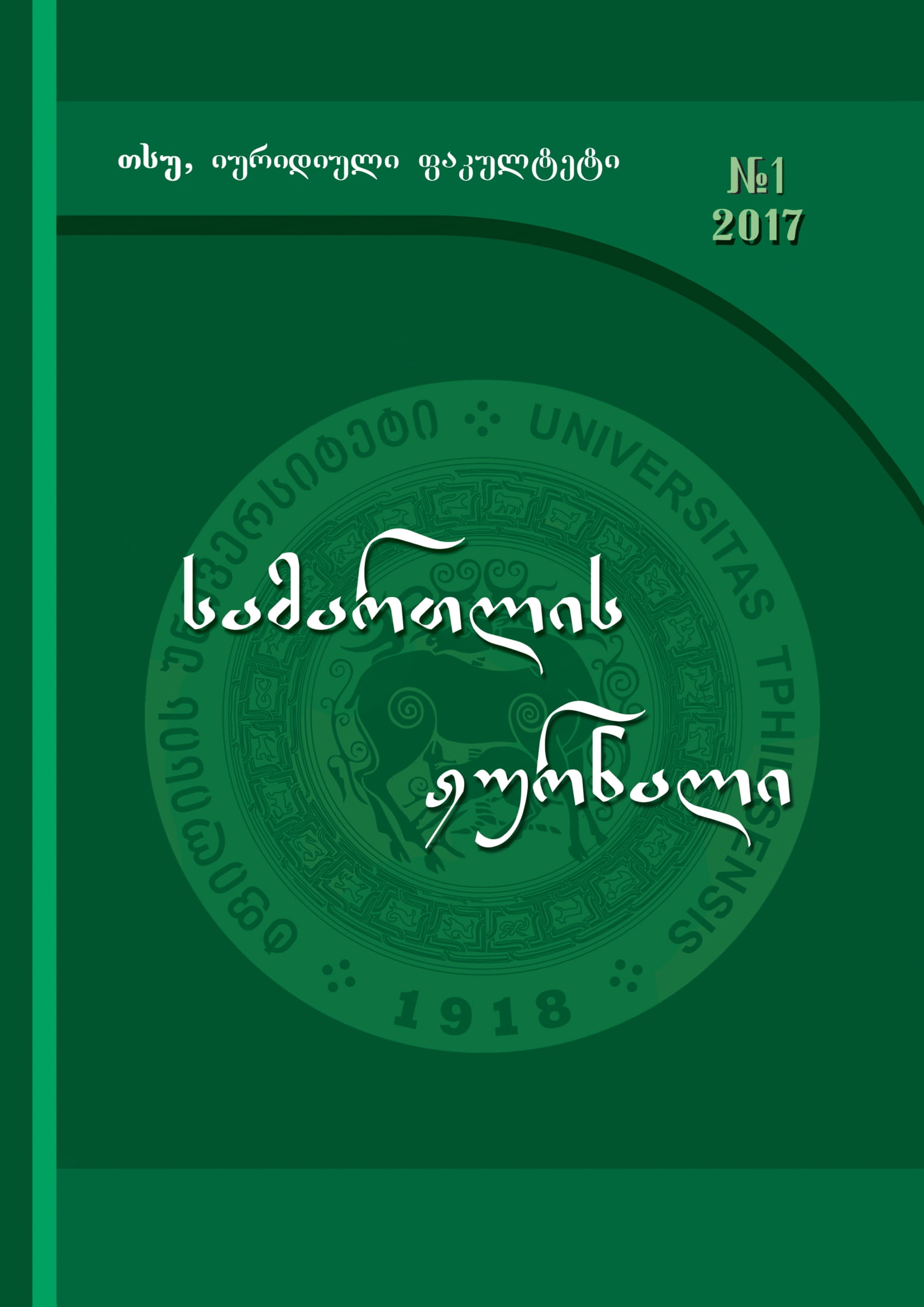დამატებითი უფლების (Poison Pills), როგორც კორპორაციულსამართლებრივი თავდაცვითი ღონისძიების, გამოყენების საკითხი (საზოგადოების საუკეთესო ინტერესებიდან გამომდინარე გადაწყვეტილების მიღების ჭრილში)
საკვანძო სიტყვები:
კორპორაციულსამართლებრივი თავდაცვითი ღონისძიებები, აქციონერის დამატებითი უფლება, „მოწამლული აბები“, საზოგადოების საუკეთესო ინტერესი, ხელმძღვანელობის მოვალეობანი, სამეწარმეო განსჯის წესი.ანოტაცია
ღია ტიპის სააქციო საზოგადოებები, როგორც წესი, დიდი კორპორაციებია, სადაც
თავმოყრილია მრავალმილიონიანი კაპიტალი. ასეთი კორპორაციების სიდიდე
გამოიხატება, ასევე, აქციონერების რაოდენობითა და ფასიანი ქაღალდებით, მათ შორის,
წილობრივი მონაწილეობის მქონე ფასიანი ქაღალდებით აქტიურ ვაჭრობაში.
ფასიანი ქაღალდების კანონმდებლობა ითვალისწინებს მნიშვნელოვანი შენაძენისას,
ასევე, სატენდერო შეთავაზების განხორციელების დროს, ტრანსაქციის გამჭვირვალეობას
და მარეგულირებლისა და ემიტენტის ინფორმირებულობას. თუმცა, მეორე მხრივ,
ღიაობის პროცესი შესაძლებლობას აძლევს კორპორაციის მენეჯმენტს, ყოველ
კონკრეტულ შემთხვევაში განიხილოს კორპორაციის სამომავლო სტრატეგია და მიზნები
და კორპორაციაში, საკონტროლო პაკეტის შესაძლო ცვლილების შემთხვევაში, მიიღოს
გადაწყვეტილება კორპორაციის, მისი აქციონერებისა და დაინტერესებული პირების
ინტერესების შესაბამისად.
საკორპორაციო კანონმდებლობა დირექტორატს და სამეთვალყურეო საბჭოს
ხელმძღვანელობის, ე.წ. ფიდუციურ, მოვალეობებს აკისრებს. მენეჯმენტი
ვალდებულია, დაიცვას გულმოდგინებისა და ერთგულების მოვალეობები და
კეთილსინდისიერების პრინციპი. მენეჯმენტის ყველა ქმედება კორპორაციის
საუკეთესო ინტერესებს უნდა ემსახურებოდეს.
აქედან გამომდინარე, მენეჯმენტის ბიზნესგადაწყვეტილებები განსაკუთრებით
საინტერესოა მაშინ, როდესაც კორპორაციას ემუქრება გასხვისება, ხოლო კორპორაციის
საუკეთესო ინტერესების დასაცავად მენეჯმენტი მიმართავს
კორპორაციულსამართლებრივ თავდაცვით ღონისძიებებს.
ერთ-ერთი ყველაზე უფრო გავრცელებული და პოპულარული თავდაცვითი ღონისძიება
არის Poison Pills, ე.წ. „მოწამლული აბები“, აქციონერის დამატებითი უფლება, რომელიც
აშშ-ის საკორპორაციო სამართლის, კერძოდ, პრაქტიკოსი იურისტების ქმნილებაა და
აქტიურად გამოიყენება აშშ-ის ყველაზე უფრო დიდი კორპორაციების მიერ.
სტატიის მიზანია, განიხილოს „მოწამლული აბების“ ფორმები და განვითარების ეტაპები,
ასევე, განმახორციელებელი მმართველობის ორგანოების საკითხი და ამ ორგანოების
მიერ მიღებული გადაწყვეტილების შესაბამისობა კორპორაციის საუკეთესო
ინტერესებთან.
ამავდროულად, სტატია მიზნად ისახავს, კრიტიკულად განიხილოს აქციონერის
დამატებითი უფლების სხვადასხვა მხარე და მკითხველს შესაძლებლობა მისცეს,
დამოუკიდებლად გადაწყვიტოს და შეაფასოს „მოწამლული აბების“ დადებითი თუ
უარყოფითი მხარეები და მისი გამოყენების შესაბამისობა კორპორაციის საუკეთესო
ინტერესთან.
წყაროები
Law of Georgia „On Entrepreneurs”, 28/10/1994.
Securities Exchange Act of 1934 06/06/1934.
General Corporation Law of the State of Delaware 10/03/1899.
Bainbridge M. S., Mergers and Acquisitions, Foundation Press, 3rd ed., N.Y., 2012, 239, 239-240, 240, 241-242, 242-243, 245.
Bainbridge M. S., Unocal at 20: Director Primacy in Corporate Takeovers, 31 Delaware Journal of Corporate Law 769, 2006, 5.
Bainbridge M. S., Director Primacy in Corporate Takeovers: Preliminary Reflections, 55 Stanford Law Review 791, 2002, 4.
Bebchuk A. L., The Case Against Board Veto in Corporate Takeover, Corporate Governance, Law, Theory and Policy, edited by Joo W. T., Carolina Academic Press, 2nd ed., Durham, 2010, 554-573, 558, 562, 562-564, 572, 572-573.
Bebchuk A. L., Coates C. J. IV., Subramanian G., The Powerful Antitakeover Force of Staggered Boards: Theory, Evidence, and Policy, 54 Stan. L. Rev. 2002, 935.
Black S. L. Jr., Why Corporations Choose Delaware, Delaware Department of State, Del., 2007, http://corp.delaware.gov/pdfs/whycorporations_english.pdf.
Burduli I., Foundations of Corporate Law, Volume II, Tbilisi, 2013, 165-166, 174-187, 254 (in Georgian).
Burduli I., Foundations of Corporate Law, Volume I, Tbilisi, 2010, 410. 330-331, 331 (in Georgian).
Chanturia L., Corporate Governance and Liability of Directors in Corporation Law, Tbilisi, 2006, 110-111 (in Georgian).
Chanturia L., Ninidze T., Commentary on the Law about Entrepreneurs, third edition, Tb., 2002, 376, 376-377 (in Georgian).
Cohen M. M., “Poison pills” as a Negotiating Tool: Seeking a Cease-Fire in the Corporate Takeover Wars, Columbia Business Law Review, Vol. 459, 1987, 11.
Gordon N. J., Mergers and Acquisitions: “Just say never?” Poison Pills, Dead hand Pills, and Share-holder adopted bylaws: and essay for Warren Buffet, 19 Cardozo Law Review 511, Yeshiva University, 1997, 3-4.
Greenfield K., There’s a Forest in Those Trees: Teaching About the Role of Corporations in Society, Corporate Governance, Law, Theory and Policy, edited by Joo W. T., Carolina Academic Press, 2nd ed., Durham, 2010, 12-17.
Hanewicz O. W., When Silence is Golden: Why the Business Judgment Rule Should Apply to No-Shops in Stock-for-Stock Merger Agreements, 28 Iowa Journal of Corporation Law 205, 2003, 5.
Hartzell C. J., Ofek E., Yermack D., What’s In It For Me? CEOs Whose Firms Are Acquired, NYU Working Paper No. FIN-01-049, 2001, 23-24.
Henry L. G., Continuing Directors Provisions: These Next Generation Shareholder Rights Plans Are Fair and Reasoned Responses to Hostile Takeover Measures, 79 Boston Law Review 989, 1999, 2, 7-8.
Ji L.X., A New Look at Dead Hand Provisions in Poison Pills: Are They Per Se Invalid After Toll Brothers and Quiturn? 44 Saint Louis University Law Journal 223, 2000, 3-4.
Lipton M., Pills, Polls, and Professors Redux, Corporate Governance, Law, Theory and Policy, edited by Joo W. T., Carolina Academic Press, 2nd ed., Durham, 2010, 573, 575, 576-577, 579-580, 580.
Maisuradze D., The Implementation of Defensive Measures during the Reorganization of Capital Entity (Comparative-Legal Study Predominantly on the Example of Delaware and Georgian Corporate Law), Tbilisi, 2015, 26-30, 201-216, 208-209, 216-217, 276-280, 230-237, 251-255 (in Georgian).
Maisuradze D., Implementation of Defensive Measures Based on “Selective Equal Treatment” of Shareholders (Comparative-Legal Study Predominantly on the Example of Delaware and Georgian Corporate Law), Journal of Law #1, Tbilisi, 2014, 123, 128, 128-129, 139-142 (in Georgian).
Maisuradze D., Elucidation of the Business Judgement Rule, Journal of Law #1-2, Tbilisi, 2010 109-111 (in Georgian).
Makharoblishvili G., General Review of Corporate Governance, Tbilisi, 2015, 140, 311-325, 315-317 (in Georgian).
Makharoblishvili G., Fundamental Structural Changes in Corporations on the Basis of Corporate And Legal Acts (Mergers & Acquisitions) Comparative-Legal Analysis), Tbilisi, 2014, 34-42, 161, 161-162, 162-163, 165, 166 (in Georgian).
Oesterle A. D., The Law of Mergers and Acquisitions, Thomson/West, 3rd ed., Ohio, 2005, 514.
Oesterle A. D., The Negotiation Model of Tender Offer Defenses and the Delaware Supreme Court, 72 Cornell Law Review 117, 1986, 3.
Pinto R. A., Corporate Governance: Monitoring the Board of Directors in American Corporations, 46 the American Journal of Comparative Law 317, 1998, 1.
Thompson O., Corporations and Other Business Associations, 5th ed., Aspen Publishers, N.Y., 2006, 779, 788-793
Turner L. K., Settling the Debate: A Response to Professor Bebchuk's Proposed Reform of Hostile Takeover Defenses, 57 Alabama Law Review 907, 2006, 4.
Velasco J., The Enduring Illegitimacy of the Poison Pill, 27 Iowa Journal of Corporation Law 381, 2002, 2, 4.
Werkheiser. W. G., Defending the Corporate Bastion: Proportionality and the Treatment of Draconian Defenses from Unocal to Unitrin, 21 Delware Journal of Corporate Law 103, 1996, 7-8.
Wulf J., Do CEOs in Mergers Trade Power for Premium? Evidence from “Mergers of Equals”, Journal of Law, Economics and Organization, 2004, 24-26.
Air Products and Chemicals, Inc. v. Airgas, Inc. 2011 WL 806417 (Del. Ch. 2011).
Moran v. Houshold International, Inc. Delaware Supreme Court, 1985, 500 A. 2 d 1346.
Paramount Communications v. Time, Inc. Delaware Supreme Court, 1990, 571 A.2d 1140.
Paramount Communications, Inc. v. QVC Network, Inc. Delaware Supreme Court, 1994, 637 A.2d 34.
Revlon, Inc. v. MacAndrews & Forbes Holdings, Inc. Delaware Supreme Court, 1986, 506 A.2d 173.
Unitrin, Inc. v. American General Corp., Supreme Court of Delaware, 1995, 651 A.2d 1361.
Unocal Corp. v. Mesa Petroleum Co. Delaware Supreme Court, 1985, 493 A.2d 946.
ჩამოტვირთვები
გამოქვეყნებული
როგორ უნდა ციტირება
გამოცემა
სექცია
ლიცენზია

ეს ნამუშევარი ლიცენზირებულია Creative Commons Attribution-ShareAlike 4.0 საერთაშორისო ლიცენზიით .









